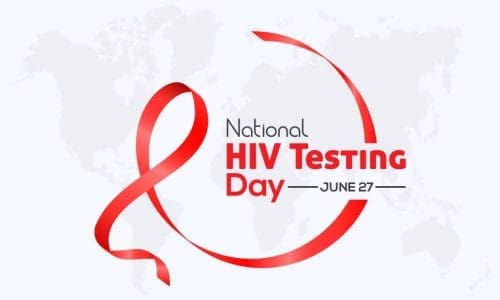
HIV Testing day. June 27. Annual health awareness concept for banner, poster, card and background design.
On June 27 each year, we observe National HIV Testing Day, a day to emphasize and encourage HIV testing in our communities.
The theme for this year’s NHTD is “Take The Test and Take the Next Step.” Get tested to check your status and be in the know. From there, you can take steps to be good to go. Find the HIV testing option that works best for you via your Healthy Connections provider.
HIV FAQ
What is HIV? HIV is a virus that attacks the human immune system. There is no cure for HIV. Unlike some other viruses, such as the common cold, HIV cannot be cleared from the body. However, there are treatments available. Talk to your Healthy Connections provider and see below for more information.
What is the difference between HIV and AIDS? Being HIV positive is not the same as having AIDS (acquired immunodeficiency syndrome). HIV is a virus that kills CD4 T-cells in the body. Over time, if so many CD4 T-cells are killed that the body has a reduced ability to fight infection, HIV can advance to AIDS.
How is HIV transmitted? HIV is transmitted through contact with certain body fluids, such as semen, vaginal or anal fluids, breast milk, and blood. Contact with these body fluids can occur during unprotected sex or when sharing needles or other items with body fluids on them. Mothers can pass the HIV virus to their babies during pregnancy, birth, and breastfeeding. You CAN NOT transmit HIV through contact with sweat, tears, saliva, bath or pool water, or by sharing dishes or drinking glasses, hugging or shaking hands.
Do you have HIV? In 2019, an estimated 1 in 8 people living with HIV in the United States did not know they had it. Everyone ages 13 through 64 should get tested for HIV at least once in their lifetime. Even if you are in a monogamous relationship, you should find out for sure whether you or your partner has HIV. Healthy Connections offers HIV and STD testing and treatment. Call 888-710-8220 for appointments or learn more at https://healthy-connections.org/stdhiv.
How can I lower my risk? PrEP (Pre-exposure prophylaxis) can stop HIV from taking hold and spreading throughout your body. It is highly effective for preventing HIV if used as prescribed. Daily PrEP reduces the risk of getting HIV from sex by more than 90 percent. Among people who inject drugs, it reduces the risk by more than 70 percent. The risk of getting HIV from sex can even be lower if you combine PrEP with condoms and other prevention methods. Call 888-710-8220 for appointments or learn more about PrEP by visiting https://healthy-connections.org/prep.



